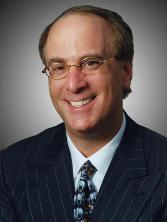Trader and financier Lawrence Fink, managing trillions.
Success in the financial markets for many traders comes so suddenly that the wave of success simply blows the head off the lucky one who held his first million in his hands.

However, an equally surprising phenomenon on Walt Street is the history of bankruptcies and suicides, when people took huge profits and were unable to keep them, moreover, they became bankrupt, went to prison or even committed suicide.
There are an order of magnitude more such stories than real success stories.
But do you know who there really are? Those who fell from the top, worked on their mistakes, and rose, despite general criticism and censure from fellow investors.
The success story of Lawrence Fink is one of those that would not be embarrassing to teach to students at any university in the world in finance classes.
The most interesting thing is that, unlike many stock exchange gurus, he had practically nothing connected with the stock exchange world; no one from his family was involved in finance.
However, there was an entrepreneurial spirit in Fink's family, as his father owned a small shoe store.
Mother was a professor at the university and taught English to students, and also gave private lessons. In general, he grew up in the most average American family.
Despite the fact that Lawrence claims that he was not at all thinking about a career in financier, his choice of education says exactly the opposite.
So after graduating from school, Lawrence Fink entered the local University of California, where he received a bachelor's degree in 1974. However, after graduating from the University of California, Lawrence became interested in finance, so he entered UCLA Anderson School where he received an MBA degree.
Laurence Fink's career path
An excellent university degree, as well as an MBA degree in finance, opened up excellent prospects for the young man on Walt Street, which he actually took advantage of.
So his first job was the investment bank First Boston, where the very young Lawrence Fink was entrusted with trading in fixed income, namely bonds.
At that time, the market was sluggish, to put it mildly, and quite safe to test the skills of a beginner.
Nevertheless, Lawrence demonstrated excellent skills, moreover, after three years of work, he was appointed chief executive officer, who was responsible for trading in mortgage-backed securities.
This is now well-known to everyone about the mortgage bubble in the United States, which affected the global economy.
And then mortgage securities were an innovation, and Lawrence Fink was the pioneer. Thanks to his genius, First Boston received one billion dollars in net profits.

Naturally demonstrating such profitability, Lawrence Fink became one of the most key figures in First Boston, moreover, he was the youngest member of the board.
Many predicted a successful career for him; moreover, there were rumors that he would head the bank. However, the dream was not destined to come true. In 1986, Lawrence and his department suffered losses estimated at $100 million.
Naturally, a lot of criticism fell on the young talent; not only did the bosses begin to egg him on, but his subordinates got out of control.
The most interesting thing is that due to the fact that Lawrence Fink brought the company about one billion dollars, they could not fire him, but at the same time, by all legal and illegal means, they put pressure on him to leave.
Own fund.
In 1988, together with his seven partners, Lawrence founded BlackRock.
After just five years, the company had about $17 billion under management, and the number of investors was growing at incredible speeds. The reason for this is that the risks are very low, and the company’s goal is to save the investor’s money as much as possible, and not to engage in aggressive trading.
In 1999, BlackRock shares were listed on the stock exchange, which led to a huge increase in the capital of the company, as well as investors.
The management amount after the placement of shares on the stock exchange was about $165 billion. BlackRock's historic move was its takeover and merger with giants such as Merrill Lynch Investment Managers in 2006 and its largest ever merger with Barclays Global Investors.
Such a merger opened up enormous technological opportunities and an incredible influx of finance, because at this stage there are about 5 trillion dollars under management.
Today, Lawrence Fink is actively searching for a successor who could lead BlackRock after his departure. The reason why he decided to leave is very simple - he is very interested in politics, moreover, he has enormous weight in the circles of the Democratic Party.
